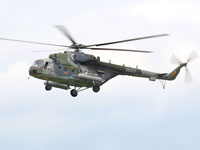|

|
|

|
The Mil
Mi-17 (also known as the Mi-8MT, NATO reporting name "Hip-H") is a
Russian helicopter currently in production at two factories in Kazan
and Ulan-Ude.
Developed from the basic Mi-8 airframe, the Mi-17 was fitted with the
larger TV3-117MT engines, rotors, and transmission developed for the
Mi-14, along with fuselage improvements for heavier loads.
Optional
engines for 'hot and high' conditions are the 1545kW (2070 shp) Isotov
TV3-117VM.
Recent
exports to China and Venezuela for use in high mountains have the new
VK-2500 version of the engine with FADEC control.
The designation Mi-17 is for export; Russian armed forces call it
Mi-8MT. The Mi-17 can be recognized because it has the tail rotor on
the port side instead of the starboard side, and dust shields in front
of the engine intakes. Engine cowls are shorter than on the TV2
powered Mi-8, not extending as far over the cockpit, and an opening
for bleed-valve outlet is present forward of the exhaust.
|
MI-17 HIP H Specifications |
|
Type |
Multi-role transport helicopter
gunship |
|
Manufacturer |
Mil |
|
Accommodation |
Two pilots and one flight
engineer and up to 32 troops or 12 stretchers |
|
Armament |
12.7mm machinegun in the nose, two 7.62mm or
one 12.7mm MG, AT-2C Swatter or AT-3 Sagger ATGMs, 57mm rocket pods (16
each), 80mm rocket pods (20 each), 250kg bombs, 500kg bombs |
|
Performance |
Max
Speed 250km/h |
|
Main Rotor Diameter |
21.5m |
|
Length |
18.4m |
|
Height |
5.7m |
|
Weight |
max take off weight 13,000kg |
|
Powerplant |
Two Klimov TV3-117VM turboshafts producing
2225shp (1,450kW) each |
|
Variants |
Number of variants produced including Mi171Sh |
|